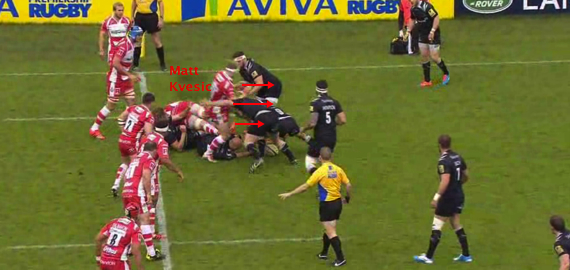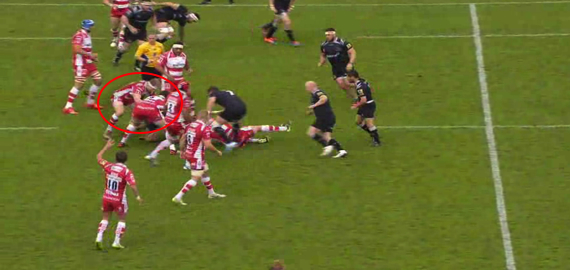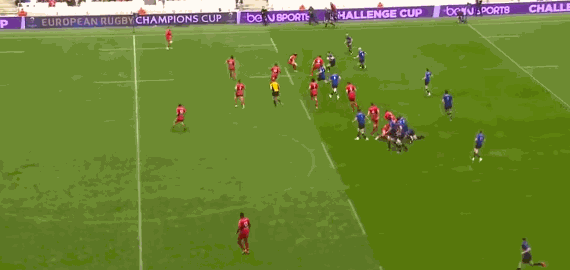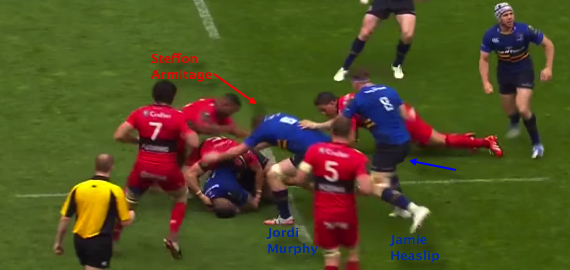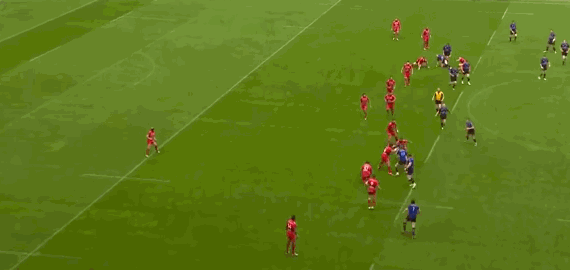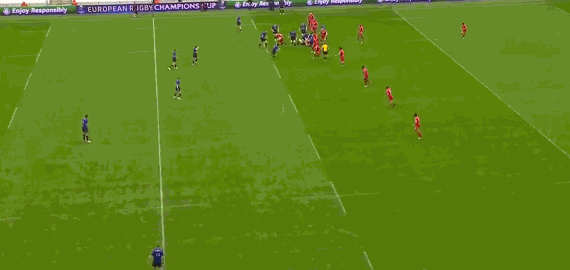English opensides Matt Kvesic and Steffon Armitage are both in action this weekend. We examine their cases for World Cup inclusion.
The number seven is almost as sacred in modern Test rugby as it is at Old Trafford, Manchester United’s theatre of dreams.
Thanks to a lineage of eye-catching, influential players from Jean-Pierre Rives via George Smith to Richie McCaw, the position of openside flanker has become almost as venerated as American football’s quarter-back.
Unless you have been living under a rock for a couple of years, debate surrounding England’s selection there will be frustratingly familiar – excruciatingly so, perhaps.
Toulon’s outstanding Steffon Armitage has thus far been barred from adding to his five caps because of a self-imposed RFU ruling decreeing that home-based players should be prioritised.
A string of individual accolades as well as two European titles have not been sufficient for Stuart Lancaster to trigger a rather vague ‘exceptional circumstances’ clause. It must be stressed that captain Chris Robshaw has probably been his country’s standout performer in this period anyway.
But the breakdown is one area England must get absolutely right if they are to taste World Cup glory. As Graham Rowntree regularly points out, it is are the sport’s most common occurrence. Consequently, a gifted exponent is worth their weight in gold.
For opensides, sapping opposition ruck-speed and generating quick ball are primary concerns. Though punters bemoaned an inability to deal with Ireland’s kicking game, this was the main deficiency when England lost 19-9 in Dublin – Joe Schmidt’s charges won the tussle on the deck comprehensively.
Armitage has been in the spotlight all week. His case will become even more compelling if he wins a third successive European crown on Saturday. That said, another candidate for an England back row berth is in action this weekend too.
Friday evening sees Gloucester clash with Edinburgh to decide the Challenge Cup. Matt Kvesic is the Cherry and White talisman, and possesses serious pedigree. Two Tests against Argentina back in summer 2013 at the age of 21 yielded 36 tackles for the former age-group rockstar, plus many other pivotal contributions to a pair of victories.
Enjoying a brilliant season, Kvesic is coming good at an intriguing time. Both he and Armitage are bustling carriers and skilful link men, but here is a look at how their breakdown work compares.
Perpetual motion
World-class openside play is not merely about snaffling the odd Hollywood turnover. The best are relentless disrupters who make their presence count whenever possible. Take this sequence of breakdowns from Gloucester’s 42-40 defeat of Newcastle Falcons on Saturday.
As the visitors attempt to settle into their phase-play at Kingsholm, Kvesic simply wants to cause chaos. First, he sniffs an opportunity to come around the side and pinch the ball.
However, referee Ian Tempest clearly tells him the ruck is still live and he has to get back onside. Kvesic cooperates and there is no penalty:
As Newcastle bring the ball right, Kvesic trusts others to tackle, staying on his feet and in the game. At the next ruck, he sees a chance to make things messy:
Here, he works off tackler Elliott Stooke. After Stooke has brought down Scott Lawson, Falcon Josh Furno slips off the clear-out so Ally Hogg steps in. This leaves the ball exposed, so Kvesic comes through the gate:
Some quick-thinking from scrum-half Ruki Tipuna, who leaves the ball to join the breakdown, keeps Newcastle in possession. It unravelled in two phases time though:

Watch how Kvesic threatens the ball, forcing the attacking support to overcommit and leave Tipuna isolated once more:
With nobody guarding the ball, the New Zealander’s pass is high under pressure from Sione Kalamafoni and the Gloucester defence can shoot up, eventually forcing a knock-on.
Minutes after coming on in the Champions Cup semi-final against Leinster, Armitage was posing similar problems.
As the Dubliners come right here, the ex-London Irish 29 year-old pounces with intent, forcing Isaac Boss into a rushed kick:
The key here is how Jamie Heaslip follows Jordi Murphy into the breakdown because he knows one clearer is simply not enough to quell Armitage:
This leaves Leinster understaffed and only Boss’ quick thinking prevents a loss of possession.
Clean steals
In the same way that buying more lottery tickets heightens your prospects of winning the jackpot, high work-rate, allied to sound decision-making around when to commit, offers more chance of pilfering the ball.
Kvesic reaped rewards against Newcastle on numerous occasions, first from this ruck:
And then by stripping it clean out of Rob Vickers‘ paws just outside his own 22:
Gloucester spread the ball left and scored through Billy Twelvetrees immediately, reinforcing the notion that turnover ball provides the best foundation from which to attack.
Toulon benefitted from this principle against Leinster. Watch their break-out subsequent to Armitage forcing the ball loose from Luke Fitzgerald‘s carry:
Post-match, Sean O’Brien voiced his opinion that Armitage had been “illegal” throughout his shift. Certainly, Matt O’Connor‘s men had reason to feel aggrieved here.
Resting on his forearms beyond the ball, Armitage cannot be supporting his own bodyweight:
That Wayne Barnes awarded Toulon a penalty advantage says as much for the difficulty of officiating the breakdown – a manic maelstrom of limbs – as it does for the fact that a reputation be your friend at times.
Whistle blowing
Overzealousness and poor judgment can easily lead to a string of infringements. Although Kvesic is still just 23, he is very mature and rarely gets caught the wrong side of the law.
This jackal against Exeter Chiefs back in January was a text book example of how to tick all the boxes a referee is looking for:
First off, as James Hook follows up his up-and-under to fell Thomas Waldrom, Kvesic holds his hands out in front of him to indicate he is not part of the tackle:
From there, he is free to latch on and does so, supporting his bodyweight amid the attentions of three opponents:
Having braced himself and shown immense strength, Kvesic cannot be shifted and Andrew Small pings Waldrom for holding on.
Precisely 79 seconds after taking the field in Marseilles, Armitage eked out something as well:
Involved in the initial tackle on O’Brien, he must make a concerted effort to demonstrate daylight between himself and his opponent, even for a millisecond, before clamping on.
From the reverse angle, we can see how polished and proficient Armitage is in this drill:
Recycling machines
As alluded to earlier, any openside has a significant say in resourcing rucks on attack. Often, this means diving in when their side is short on numbers to shift any circling vultures and ensure the movement can continue.
While Kvesic’s senior international career has been stop-start, he has been excellent in this regard. In the mid-week game last June against the Crusaders, he won the man-of-the-match gong, aiding England’s cause with unheralded moments like this:
England almost fall victim to a robust counter-ruck from All Black Luke Whitelock here, but Kvesic’s bravery and quick thinking salvage the situation.
Two England backs have blown past the ball, leaving it exposed and therefore ending the ruck. Assessing the situation, he crouches to pick up…
…before absorbing the impact and falling backwards to present a target to his support, in this case James Haskell, who can protect the ball from incoming Crusader Jordan Taufua:
Another subtle intervention from Kvesic in a white shirt came this January as Ireland Wolfhounds were beaten 18-9. Track him during Henry Slade‘s try.
After shipping on to Elliot Daly, he gets to his feet to make a decisive clear-out, allowing scrum-half Lee Dickson a pristine platform from which to deliver the scoring pass:
Toulon’s power runners mean Armitage is rarely required to scramble back behind the gain-line. Still, a blend of technique and intelligence means he is rarely beaten to the punch.
Indeed, this time he won a penalty for the Top 14 giants as he looks to clear Murphy before Jimmy Gopperth has rolled away from the tackle area:
Armitage’s next assignment is the might of Clermont, and he will relish the chance to maraud around Twickenham.
Justifiably, fear of rocking the boat may be too overpowering for Lancaster to pick him for the World Cup. But you can be sure his prowess has been studied at length.
Kvesic can probably look forward to a place in the 45-man summer training and from there he must impress. A tournament place is far from guaranteed.
Whatever happens though, England know the value of breakdown specialists. This weekend will make for interesting viewing, not to mention more fanatical discussion.








